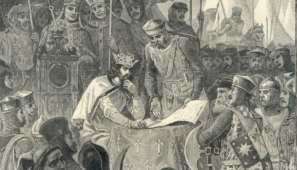The Arraignment Clause
The Arraignment Clause is the part of the 6th Amendment to the US Constitution which guarantees that when a person is accused of a crime by the government, he must be notified of the specific charges against him. The Founding Fathers included this clause in the Bill of Rights, because they were well aware of the history of religious and political persecution in the Courts of England and Europe. The Arraignment Clause reads like this:
"In all criminal prosecutions, the accused shall enjoy the right... to be informed of the nature and cause of the accusation."
Purpose of the Arraignment Clause
To be arraigned means to have the charges formally read to you. When this happens, it is called an "arraignment," hence, the name "Arraignment Clause."
Arraignments must present very specific charges mentioning dates, facts and the specifics of the alleged crime. Without this safeguard, people could be charged more than once for the same crime and they wouldn't be able to prepare an adequate defense against the charges.
History of the Arraignment Clause
The idea that people should be informed of the charges against them makes common sense to most people today, but that is precisely because the Founding Fathers put this clause in the 6th Amendment.
At one time in English history, people could be brought before a court, tried and sentenced, never having learned what the charges against them were! Prior to the 1100's, people could be hauled before a court by a simple accusation. No proof or evidence was necessarily gathered. This occurred in ecclesiastical courts, which were courts run by the Catholic Church.
 King John signing the Magna Carta - 1215
King John signing the Magna Carta - 1215Henry II started a period of judicial reform that was codified in the Assize of Clarendon. The Assize required that a jury of local people bring forth evidence to substantiate a criminal charge. Later, the Magna Carta of 1215 limited the monarch's power in several ways, including requiring that no charges or punishments be brought against people without evidence located by a jury of local people and according to established law. You can read Magna Carta here.
Over the next several hundred years, the idea that there must be specific charges before being tried by the court began to take more and more hold, although there were still periods where the courts could "try" people with no evidence and without even telling them the charges against them.
By the time the colonists were first coming to America, notification of the charges was an established part of English law. It was very important to the early colonists, most of whom were Puritan or Quaker dissenters against the Church of England, because many of their friends and ancestors had been tried before English courts just because of their religious beliefs. They were often hauled in, sentenced and punished without being informed of the charges.
Consequently, most of the early colonies built an Arraignment Clause notification of charges into their legal systems. By the time the Constitution was written in 1789, most of the states had included an Arraignment Clause in their state constitutions as well.
When James Madison proposed twenty amendments to the United States Constitution, on June 8, 1789, during the First Congress, one of his proposed amendments included a notification requirement. The fact that it was accepted with little or no discussion shows how fundamental this right was to the Founding Fathers.
Arraignment Clause in everyday life
Generally, charges brought before a court must be so specific that someone could not be charged again for the same crime. Vague wording is not allowed, even if the language in the charge is taken straight from the written statute. Instead, specific dates, facts and ingredients of the alleged crime must be clearly spelled out. The defendant must have all the facts presented to him so he can adequately prepare to defend himself against the charges.
The government must prepare the specific charges and notify the defendant, but the government is not required to give him a copy of the charges free of charge.
Originally, all of the First Ten Amendments in the Bill of Rights applied only to the Federal government. After the Civil War, the 14th Amendment was added to the Constitution to guarantee equal treatment for former slaves. Through the 14th Amendment's Due Process Clause, the Supreme Court began to apply all of the restrictions in the Bill of Rights against the states as well, including the Arraignment Clause. You can read the 14th Amendment here.
You can read about several interesting and significant Sixth Amendment Court Cases dealing with the Arraignment Clause here.
Return to 6th Amendment.
Other 6th Amendment clauses:
Speedy Trial Clause
Public Trial Clause
Right to Trial by Jury Clause
Confrontation Clause
Compulsory Process Clause
Right to Counsel Clause
Amendments:
Preamble to the Bill of Rights
Learn about the 1st Amendment here.
Learn about the 2nd Amendment here.
Learn about the 3rd Amendment here.
Learn about the 4th Amendment here.
Learn about the 5th Amendment here.
Learn about the 6th Amendment here.
Learn about the 7th Amendment here.
Learn about the 8th Amendment here.
Learn about the 9th Amendment here.
Learn about the 10th Amendment here.
Revolutionary War and Beyond Home
Like This Page?
© 2008 - 2022 Revolutionary-War-and-Beyond.com Dan & Jax Bubis











Facebook Comments